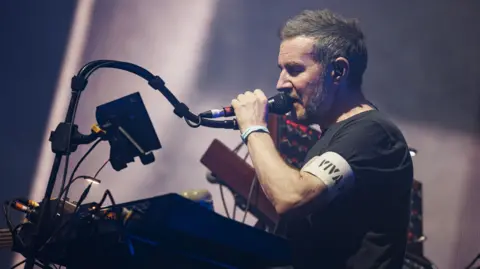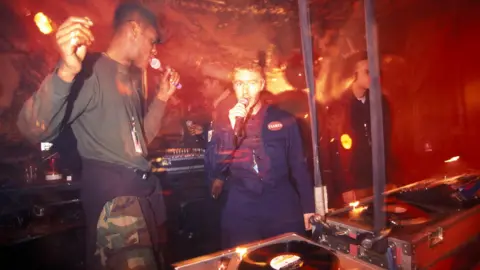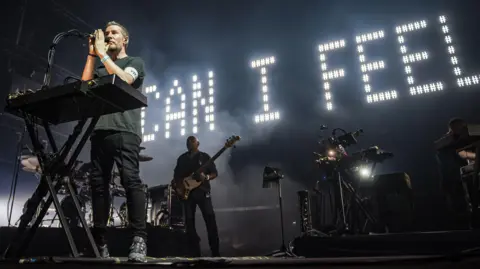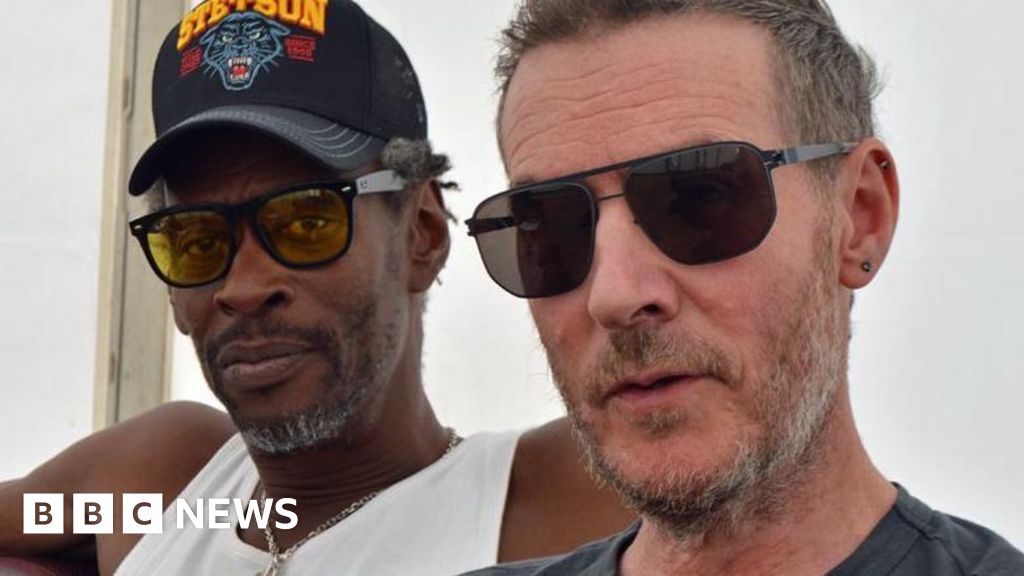 BBC
BBCMassive Attack helped redefine British music in the 1990s. Now the seminal Bristol band are trying to change the music industry’s record on climate action, which they say has been stuck for too long.
Massive Attack hope their fans won’t notice much unusual about their mini-festival this weekend – their first show in their home city for five years.
“If it goes according to plan, it will just feel like a normal gig to most people,” band member Robert Del Naja says.
“No-one will know the difference. They will come to the gig, it will rain, there will be great music, it will be a visual spectacle, they’ll leave and they’re happy.”
 EPA
EPAFans might spot a few changes from other gigs, though.
All the food will be vegan. All the loos will be compostable. If they’re really observant, people might spot (electric) vans containing large batteries occasionally topping up other large batteries around the site.
Perhaps the biggest difference will not be in the show but outside.
There’s no car park.
Instead, the 34,000 attendees are strongly encouraged to walk, cycle or get public transport – including on one of five special trains laid on to take people back across the south-west at the end of the bank holiday Sunday night.
Massive Attack say the show will be the lowest-carbon concert of its scale ever held, and want it to provide a template for the rest of the live music industry to follow.
“This experiment, by its very virtue of being here, is hopefully going to create some activity,” Del Naja says. “And it’s a sector which has a lot to say about climate change, but unfortunately it’s not doing much about it.”
 Getty Images
Getty ImagesIn the 90s, Massive Attack led a wave of delirious downbeat dance music dubbed trip-hop in an area that saw their two biggest hits – Unfinished Sympathy and Teardrop. Back then, few people gave serious thought to the environmental impact of touring.
“We’re very aware of the polluting we’ve done, which is why we’re doing this.”
Del Naja, also known as 3D, is the driving force behind the group’s drive to be as sustainable as possible. Bandmate Grant Marshall, or Daddy G, is fully on board too.
Why do they feel so strongly? “It’s simple,” Marshall says. “It’s because there’s only one planet, and we’ve got to try and save it.
“Everybody knows what’s going on, and if we can do our bit to try and save something for the future, then it seems like a no brainer.”
The Bristol concert comes five years after Massive Attack commissioned the Tyndall Centre for Climate Change Research to write a report setting out a roadmap for “super low carbon live music”. They are now attempting to put as much of that as possible into practice.
Other measures being taken include:
- priority ticket sales for Bristol residents
- free electric shuttle buses to and from Bristol’s two main stations
- a separate bar and toilets as an incentive for people who have travelled from outside Bristol by train
- site powered by renewable electricity
- all food outlets are plant-based and with compostable cutlery and serving items, with food waste minimised, and nothing going to landfill
The band are disappointed by how much attention others in the music industry have paid to the research they commissioned.
“It’s been five years and no-one’s shown much interest,” Del Naja says. “A couple of bands, a couple of promoters, but very little interest.
“In fact, most other promoters say ‘we’ve got our own report’, which is slightly ridiculous because those reports are written by their own team. So that’s been really quite frustrating.
“The other frustration is that there’s a whole cluster of NGOs [non-governmental organisations] that have been built over the last 10 years that take a lot of public money to talk about how they may reduce emissions in the future, and to do impact reports. We’ve already done an impact report. It’s publicly available.
“You don’t need to do another impact report. We don’t need any more pledging. We don’t need to take more public money to do this. It already it exists. The best thing to do is put it into action. So I find that frustrating.
“But it also means that the sector itself, and particularly the most powerful agents in the sector, the big promoters, don’t get to do anything. They can just keep parking it – another five years, another five years, while we write another impact report.
“So we’ve tried to bypass that leap over it all and just put it as much into action as we possibly can.”
 EPA
EPAOther bands have been taking action. Coldplay have said their 12-step plan – including eye-catching initiatives like a kinetic dancefloor and electricity-generating bicycles – cut the carbon emissions of their last world tour by 59%.
Massive Attack say they have found ways to cut emissions on their current European tour, as well as for the one-off Bristol show.
They have cut down on equipment so they take two trucks on the road instead of the previous six. “And we’re traveling by train as much as we can across Europe,” Del Naja says.
“That’s the bit we’re trying to do ourselves. And every festival we go to, we try to encourage the promoters to look at the technology we’ve employed and we show them the Tyndall report.”
Put to the test
Even before commissioning that research, they were asking promoters to make changes to cut emissions – such as the last time they headlined a mini-festival on Bristol’s Clifton Down, eight years ago.
“We had our arguments then,” Del Naja says, but they were met by “that fear of the bottom line being affected by every decision you make”.
“It hasn’t been so difficult this time,” he says.
They have now got others on board, like transport and power firms. GWR is laying on the extra late-night trains, and Ecotricity is supplying 100% renewable electricity to the batteries.
“I think the only time we’ll know it’s worked is when we walk off stage and there’s been no power cuts in between,” Del Naja says.
“That’s going to be the moment I’m waiting for. We bow off stage, lights out, great, no interruptions.”
More research will be compiled afterwards about what worked and what didn’t, which Del Naja hopes will be “transformational” for the industry.
‘Pieces of the puzzle’
The show is pioneering for the way it is trying to combine a wide range of environmentally-friendly measures, according to Adam Corner, a Bristol-based writer and researcher on climate and culture.
Many of the technologies and techniques have been tried out by other festivals and events. Some, like putting on special late trains, are more unusual.
“It showcases what’s possible, because there’s been a little bit of commentary from people saying, well it’s great they’re doing it, but can you replicate it for other shows?” he says.
Many people in the music and creative industries agree that things could and should be improved – and some artists, organisers and bodies have been trying for years – but progress has been slow, he says.
“Other industries have got clearer plans and central targets, so you can see progress being made. Whereas, I think with lots of individual [music] events and acts, it’s been slower for all this to come together and be co-ordinated.
“So the more that we can see all the pieces of the puzzle in place, and what that looks like, it really does help show other events what’s possible – without necessarily assuming that everyone can do all of it straight away.
“Someone needs to go first in putting all of the pieces of the puzzle together.”


